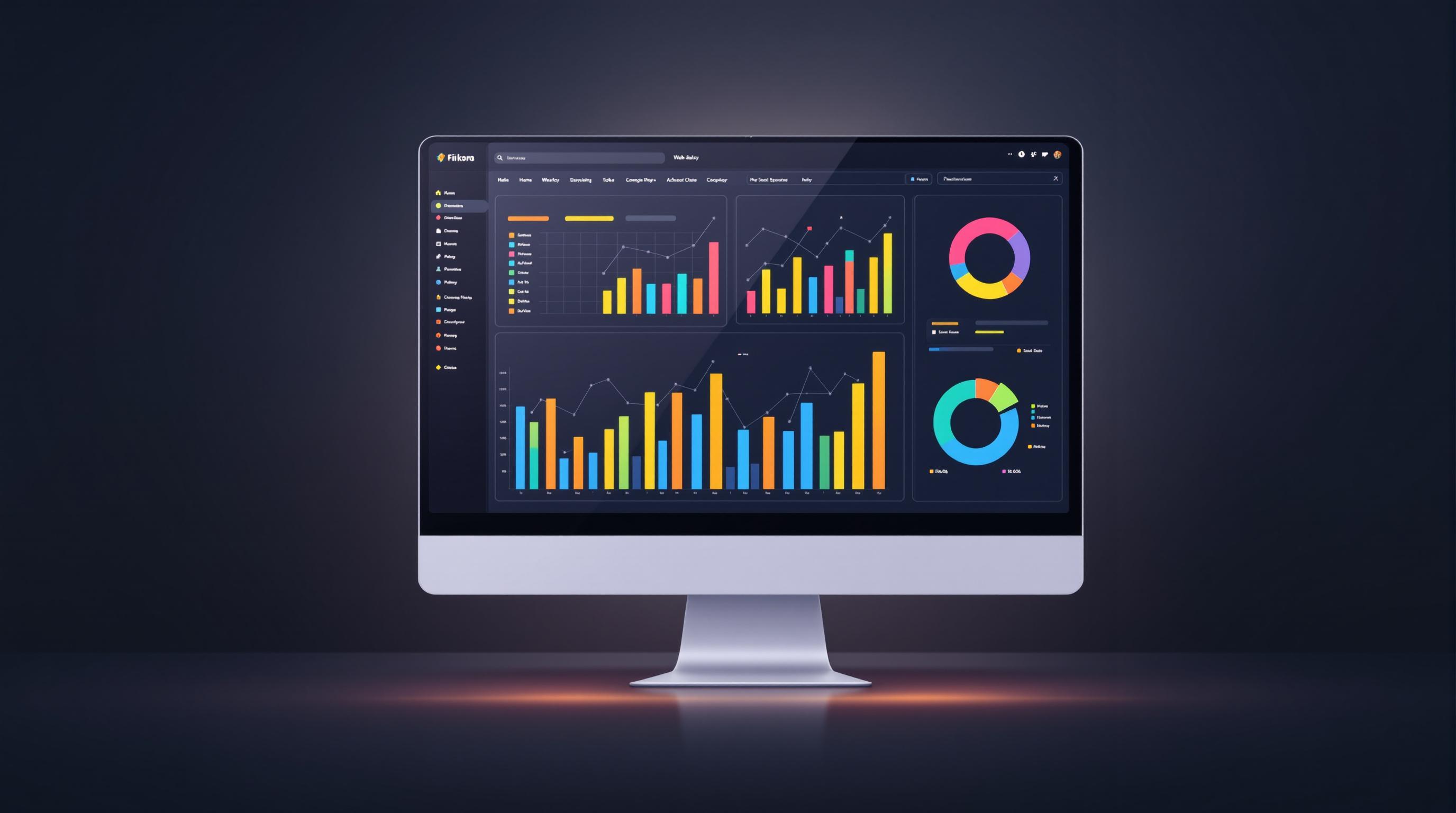- The travel and hospitality industry is using data and AI to improve guest experiences, optimize operations, and increase revenue.
- Hotels using AI-powered dynamic pricing saw 6–10% revenue growth per room, while AI chatbots boosted direct bookings by 25%.
- Personalized guest experiences are in demand, with 61% of travelers willing to pay more for tailored services, but only 23% currently receive them.
- Operational improvements include: 20–40% energy savings with AI, smarter staff scheduling, and predictive maintenance to reduce downtime.
- Data security is critical: 31% of hospitality businesses experienced breaches, costing $2.94 million on average.
Quick Wins for Businesses:
- Use AI for dynamic pricing and personalized recommendations.
- Leverage guest feedback for targeted service improvements.
- Strengthen data security with role-based access and fraud detection tools.
This article explains how data-driven strategies are transforming travel and hospitality, offering practical solutions for better guest experiences, efficient operations, and higher profits.
Scaling Data-Driven Solutions In Global Hospitality With Marriott

Creating Personalized Guest Experiences
The hospitality industry is increasingly using data to tailor guest experiences, with 61% of hotel guests expressing a willingness to pay more for customized services. However, only 23% of guests currently report receiving such experiences, highlighting a big gap and room for improvement.
Smart Travel Recommendations
Hotels are leveraging AI to analyze guest data and deliver tailored suggestions. A great example is Hyatt's collaboration with Amazon Web Services. By studying customer preferences and offering specific hotel options and add-ons, Hyatt generated nearly $40 million in extra revenue in just six months.
Here's how recommendation engines use data to personalize experiences:
| Data Source | Insights Generated |
|---|---|
| Reservation History | Room preferences and typical length of stay |
| Loyalty Programs | Spending habits, amenity usage, and reward redemptions |
| Website Interactions | Search patterns and booking behaviors |
| Guest Feedback | Service preferences and areas needing improvement |
This approach not only boosts revenue but also improves guest support and satisfaction.
AI Customer Service Solutions
AI-powered tools are transforming how hotels handle customer interactions:
- Velma AI Assistant: Handles 75% of customer queries without human help.
- Chatbots and Voice Assistants: These solutions have increased guest satisfaction by 20%.
"We saw how technology is being harnessed to enhance efficiency and the guest experience: analyzing big data allows hoteliers to gather more insight and thus proactively customize their guests' journey. However, we recognized that hospitality professionals' warmth, empathy, and individualized care remain invaluable and irreplaceable. The human touch makes guests feel appreciated and leaves an indelible impression on them." - EHL Students
Data-Driven Marketing
Personalized marketing builds on smart recommendations and automated services to engage guests even further. AI-driven campaigns have:
- Boosted direct bookings by 8%.
- Engaged 35% more users with tailored promotions.
- Increased booking likelihood by 78%.
Hilton's AI concierge, Connie, is a standout example of this approach. Connie has improved guest engagement with concierge services by 10% and cut wait times by half during busy periods. It provides instant local recommendations and answers common questions, freeing up staff to handle more complex tasks.
Additionally, integrating IoT devices with AI systems allows hotels to automatically adjust room settings - like temperature, lighting, and entertainment - based on guest preferences. With nearly half of travelers willing to share personal data for a tailored stay, this level of customization is becoming increasingly important.
Improving Business Operations with Data
Using data analytics can streamline operations, improve resource use, and enhance revenue strategies. These operational upgrades also complement the guest experience improvements discussed earlier.
Price Optimization and Forecasting
AI-powered systems adjust prices dynamically, factoring in real-time market trends, competitor pricing, and booking behaviors to maximize revenue potential.
| Impact Area | Results Achieved |
|---|---|
| Revenue Per Room | 6-10% increase |
| Forecast Accuracy | 15-30% improvement |
"Airlines have long been pioneers in dynamic pricing, adjusting fares based on demand, booking patterns, and other factors. Hotels and other travel companies can adopt similar strategies to adjust room rates and package prices in real time, allowing them to better match market conditions and optimize revenue." - Lee Taylor, head of hospitality sales, at Capgemini
Staff and Resource Planning
Data-driven tools help create efficient schedules, ensuring the right staffing levels while cutting costs. For instance, reducing hiring expenses, which average $4,700 per employee, becomes more achievable with smarter planning.
Some key strategies include:
- Tracking demand patterns
- Analyzing seasonal trends
- Automating scheduling processes
"Data isn't just another piece of the puzzle; it's the solution you've been waiting for." - Corey McCarthy, Chief Marketing Officer (CMO), Unifocus
Smart Maintenance Planning
By integrating sensor data with Computerized Maintenance Management Systems (CMMS), businesses can predict and address equipment issues before they escalate. Essential tools for this approach include:
- Infrared sensors
- Vibration and ultrasonic sensors
- Motor circuit analyzers
This proactive method reduces downtime and ensures operations run smoothly.
"AI's integration into the hospitality industry has not only allowed brands to offer a superior customer experience but it's also empowered employees and streamlined operations." - Jolene Amit, Chief Marketing Officer at aiOla
Investments in technology within the travel sector are expected to grow by 14% in 2024, with 91% of companies planning to significantly boost their tech budgets. This shift highlights the increasing importance of data-driven strategies for staying competitive in today’s hospitality market.
sbb-itb-f2fbbd7
Using Customer Feedback to Improve Services
As the hospitality industry evolves with data-driven strategies, guest feedback remains a crucial tool for refining services and meeting customer expectations.
Online Review Analysis
Analyzing online reviews can reveal valuable insights. Tools like sentiment analysis help sort reviews by emotional tone and specific service areas, making it easier to pinpoint what’s working and what needs improvement.
Key areas to monitor include:
| Service Aspect | What to Monitor |
|---|---|
| Room Quality | Cleanliness, comfort, amenities |
| Staff Service | Response time, friendliness, issue handling |
| Facilities | Maintenance, accessibility, availability |
| Value | Price-to-quality ratio, package offerings |
"Customer feedback is the core of developing the brand further. Customer feedback drives innovation." - Frank Seedorf, Chief Digital Officer at B&B Hotels
These insights help businesses measure satisfaction and prioritize changes.
Measuring Customer Satisfaction
Metrics like Net Promoter Score (NPS) and Customer Satisfaction Score (CSAT) are widely used in hospitality to assess guest experiences. These tools highlight trends and identify areas that need attention.
For example, TIME Hotels introduced a digital check-in system after feedback revealed long wait times. This change not only improved customer satisfaction but also streamlined operations.
"Key elements for creating a positive hotel reputation include accepting and handling guest feedback honestly. We spend time reading all reviews, including negative ones, to identify opportunities for improvement. We carefully analyze each situation to understand what did not work and what areas require improvement. This process helps us to effectively enhance and manage our reputation." - Elisa Gonzo, Senior Hotels Excellence Manager, Gardaland Resort
These metrics serve as a foundation for making targeted upgrades.
Service Updates Based on Feedback
Turning feedback into actionable improvements requires a structured approach. TIME Hotels serves as a great example - they installed free EV chargers in Dubai properties in September 2022 after noticing guest demand. This not only enhanced the guest experience but also strengthened their appeal for business travelers.
Acting on feedback promptly is key, as retaining customers is far more cost-effective than acquiring new ones.
"AI can use occupancy data, guest feedback, and self-reported guest data to gauge which upgrades, or repairs should be implemented first and which improvements will deliver the best return." – Seth Redmore, CMO at Lexalytics
When prioritizing changes, businesses should focus on:
- Frequency: Addressing recurring issues
- Impact Severity: Fixing problems that affect safety or comfort
- Feasibility: Implementing changes within existing resources
- Return on Investment: Focusing on improvements that offer the best cost-benefit balance
Data Security and Risk Management
Protecting guest data and preventing security breaches is a top priority for travel and hospitality businesses today. Recent statistics reveal that 31% of hospitality companies encountered data breaches, with an average cost of $2.94 million between 2021 and 2022. This highlights the pressing need for strong fraud prevention, data protection, and emergency response strategies.
Preventing Booking Fraud
Fraudulent transactions, especially in online bookings, are a growing concern for the hospitality sector. Fraud rates for online bookings are seven times higher than for in-person card transactions. To combat this, many businesses now rely on AI and machine learning systems.
| Fraud Detection Method | Accuracy Rate | Key Benefits |
|---|---|---|
| Random Forests | 95%+ | Detects patterns effectively, scalable |
| Neural Networks | Used by 50% of institutions | Adapts to new threats, offers real-time detection |
| Logistic Regression/SVM | 99%+ | High precision, minimizes false positives |
"Efficient anti-fraud measures are essential for hotels to protect their sales volumes, maintain operational efficiency, and retain customer trust." - Shahinez Guetal, Area Front Office Manager at Marriott International
While fraud prevention strengthens transactional security, protecting customer data is just as critical.
Customer Data Protection
Data breaches can severely damage consumer trust, with 65% of customers losing faith in a brand and 80% avoiding future interactions after a breach. To address this, hotels are adopting advanced security measures:
1. Data Access Controls
Implementing role-based access control (RBAC) systems ensures only authorized personnel can access sensitive information. Given that 84% of serious cybersecurity incidents are caused by human error, monitoring how employees handle data is essential.
2. Third-Party Integration Security
Carefully evaluating vendors and securing API connections are crucial steps. For instance, Revinate's Customer Data Platform (CDP), launched in 2024, helps hotels comply with GDPR and CCPA by centralizing control over customer data.
"As leaders in this industry, we must commit to enforcing all of our current security protocols, transforming APIs into secure, robust assets. This shift is not merely about safeguarding data; it's a fundamental aspect of maintaining the trust and loyalty of our guests." - Kevin King, Chief Operating Officer, Shiji Group
In addition to these measures, having an emergency plan in place is vital for business continuity.
Emergency Planning
A well-prepared emergency response plan combines preventive measures with the ability to react quickly. Key components include:
| Component | Purpose | Implementation |
|---|---|---|
| Incident Response Plan | Contain breaches swiftly | Define specific protocols for various scenarios |
| Continuous Monitoring | Detect threats early | Use advanced alert systems for unusual activity |
| Data Recovery | Ensure operations continue | Maintain regular backups and restoration processes |
Failure to comply with regulations like GDPR and CCPA can result in hefty fines - up to €20 million or 4% of global turnover for GDPR, and $7,500 per incident for CCPA violations.
"The biggest benefit is you're replacing overly manual, error-prone processes with automation – without even losing any control. This makes it much easier to stay ahead of fraudsters and make data-driven, accurate decisions about who to trust." - Kevin Benham, Vice President of Customer Success at Sertifi
Conclusion: Implementing Data Solutions
Key Takeaways
Using data-driven tools can improve guest experiences and make business operations more efficient. For example, when Scalista GmbH started using InstantAPI.ai's Web Scraping API in March 2023, they cut manual data entry by 40% and boosted data processing speed by 25% [1]. This demonstrates how the right tools can lead to noticeable improvements in efficiency.
Steps to Start Using Data Tools
To see similar results, it's important to approach data solutions with a clear plan. A phased strategy can help ensure a smooth transition and maximize benefits.
Here are some key steps for travel and hospitality businesses:
-
Assess Data Needs
Determine what data is most important for your operations and how it can integrate with your current systems. -
Choose the Right Tools
Look for tools that fit seamlessly into your existing setup and meet high security standards."After trying other options, we were won over by the simplicity of InstantAPI.ai's Web Scraping API. It's fast, easy, and allows us to focus on what matters most - our core features." - Juan, Scalista GmbH
-
Plan the Rollout
Start with core functionalities and gradually expand based on measurable results.
Success relies on selecting tools that offer real-time data processing, easy integration, strong security, and the ability to grow with your needs.


